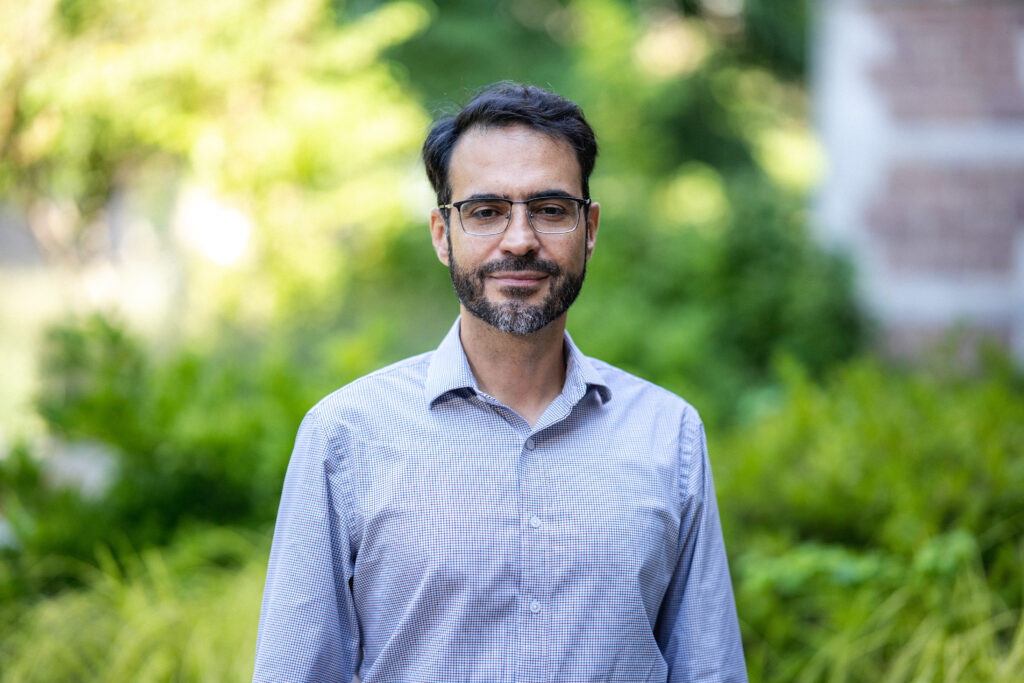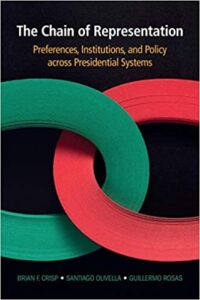Known as an exceptional teacher, scholar, and mentor, Guillermo Rosas studies the economic consequences of political regimes and the effects of political institutions on political elite behavior, especially in Latin America.

Rosas is the co-author, with Washington University colleague Brian Crisp and Washington University alumnus Santiago Olivella, of The Chain of Representation. Preferences, Institutions, and Policy Across Presidential Systems(Cambridge University Press, 2020). His other publications include Curbing Bailouts. Bank Crises and Democratic Accountability in Comparative Perspective (University of Michigan Press, 2009), Latin American Party Systems (Cambridge University Press, 2010), and numerous articles on comparative politics.
In 2020, Rosas received a seed grant from the McDonnell International Scholars Academy, which funded projects that explored the international social, economic, and public health ramifications of the COVID-19 outbreak as well as lessons for future pandemics. His collaboration with partnering institutions Universidad Alberto Hurtado, Universidad Los Andes, and Pontifícia Universidade Católica do Paraná focused on the interaction of political attitudes and public health during the COVID-19 outbreak in Brazil, Colombia, Chile, and Mexico. His remarks on this study, and on the broader topic of institutional effects on political behavior, follow. Rosas also explains why the Department of Political Science at Washington University rates among the world’s best.
Projects and interview
On “Does Politics Make You Sick: Examining the Influence of Political Ideology on COVID-19 Mitigation Across the Americas”
This project stemmed from the observation early in the pandemic that President Trump peddled advice and promoted policy that was unsound from a public health perspective but that appealed to his electoral base. We saw that the common wisdom about the U.S. case — a populist, anti-establishment political leader exploiting societal rifts for political purposes — had an obvious parallel in Latin America, where presidents with very similar populist styles initially sought to override the advice of public health officials at the beginning of the pandemic. (Recall President Bolsonaro’s claims about the curative powers of ivermectin, copied from Trump, or President López Obrador’s public utterances about the salvific intervention of religious images.) In any case, the narrative that populism would thwart evidence-based public health interventions motivated our desire to compare four Latin American countries, two with populist leadership and two headed by established parties.
Though the premise of our project is relatively simple, we were interested in verifying intervening mechanisms that we presumed were at play. Were citizens espousing attitudes and behaviors about COVID-19 that appeared to be driven by their partisan allegiances or ideological predispositions? Were these attitudes and behaviors consistent with their own views on science and religion? Would citizens support or object to containment policies driven by political animus or based on fears about the spread of the disease? And would all these attitudes vary systematically across countries with populist leaders?
Our project benefited from the participation of a team of political scientists and epidemiologists at Washington University and at four Latin American institutions, including our McDonnell Academy partner in Mexico, Tec de Monterrey. We collected a treasure trove of information from two large online samples of individuals in Brazil, Chile, Colombia, and Mexico that approximate the basic socioeconomic characteristics of these countries rather well.
More importantly, we were able to recontact about 75% of respondents in our second survey, fielded 15 months after the first one. Put together, these comprehensive surveys span the toughest period of the pandemic as we went from basic preventative measures to extended vaccine rollouts. At this point, we have published one article on pandemic-driven preferences regarding access to pension savings (a big deal, especially in Chile), an epidemiologist member of our team is driving two more papers on effects on health, and I’m currently drafting the main paper on “Does Politics Make You Sick…” after carrying out all the required analyses.
What other research projects are you pursuing in Latin America?
While my research interests transcend Latin America, I have studied the behavior of political elites in the region throughout my career. Consistent with a longstanding approach to the study of politics, I focus on institutional effects on political behavior, rather than, for example, on cultural motivations. I am often taken aback by the instinct that we all have — I have it in spades — to look for the “cultural” origins of behaviors that we do not readily understand. My view is that individuals are first and foremost creatures that respond to incentives rather than creatures of habit; therefore, we ought first to try to explain behavior by considering differences in the rules that structure political decision-making processes in democracies, including electoral rules, legislative policy-making, and relations between separate powers in presidential regimes.
I have been very fortunate to have found great mentors and colleagues at Washington University who have helped me further this approach. One of these mentors, Brian Crisp, has devoted a good chunk of his career to very similar endeavors. Our book, The Chain of Representation, written in conjunction with Santiago Olivella, a graduate of our program, is a long exploration of how democratic institutions in Latin America’s presidential regimes advance or hinder the possibility of representation of citizen preferences and politicians’ accountability to citizens.
Part of the reawakening of populist politics over the past decade can be understood against the backdrop of institutions of democracy that have failed to produce reliable representation of citizens and mechanisms that make it easier for policymakers to be responsive to their constituents’ wants. In the book, we parse out how institutions operate at every link in the chain, which goes from what citizens want to what policymakers deliver.
What brought you to Washington University?
I first arrived at WashU in 2003, with a courtesy visiting professor appointment in the Department of Political Science. My spouse, Professor Tabea Linhard, had been offered an assistant professor position in the Department of Romance Languages and Literatures. I had a similar offer from a public university on the west coast, but had been advised that funding for my position would not arrive until 2004. In 2003, the Department of Political Science at WashU was approved to search faculty in the field of comparative politics. I decided to apply for the position and had the great fortune of receiving an offer to join the faculty.
All hands on deck for graduate placement
Graduate students in political science at Washington University have seen remarkable outcomes in the academic job market, earning multiple interviews and offers and accepting excellent placements. One key to the success of the highly ranked graduate program is a team-based approach to mentoring and navigating the job market.
Washington University has long been considered home to a top-notch, distinguished political science department. What sets it apart from the others?
Compared to other highly-ranked political science departments in the country, ours has always been relatively small and relatively focused in its commitment to theory-driven, evidence-based scientific inquiry into political phenomena. This feature has allowed the department to develop a recognizable reputation in the field, despite its size. In addition, the department has long excelled in building an environment where faculty collaborate productively to support young scholars who choose to pursue graduate studies with us.
The Chain of Representation: Preferences, Institutions, and Policy across Presidential Systems
Comparative quantitative analyses covering 18 Latin American countries in The Chain of Representation shows that presidential democracies vary greatly in the degree to which they demonstrate responsiveness to their electorates.

In this book, we parse out how institutions operate at every link in the chain, which goes from what citizens want to what policymakers deliver.
Professor Guillermo Rosas